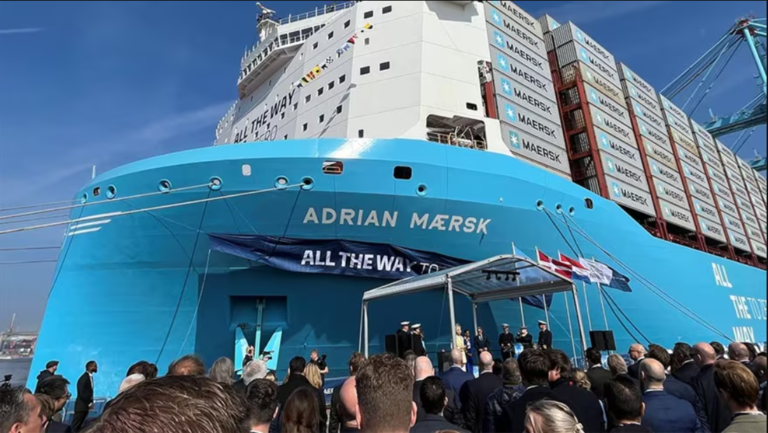Danish Shipping Giant Maersk Names New Dual-Fuel Methanol Containership in Rotterdam
A.P. Moller – Maersk recently held a naming ceremony for its latest dual-fuel methanol containership at the APM Terminals Maasvlakte II terminal in Rotterdam, the Netherlands. The vessel, boasting a capacity of over 16,000 TEUs, was christened Adrian Maersk during the event.
The new containership is set to operate on the Asia-Mediterranean trade route upon completing its inaugural voyage from Rotterdam. It will be a key component of Maersk’s new East-West network, designed to achieve a schedule reliability exceeding 90% once fully implemented. Maersk emphasizes the importance of its hub terminals, such as APM Terminals Maasvlakte II, in realizing this goal.
Stephanie Pullings Hart, Executive Vice President and COO at Nestlé and the ship’s godmother, highlighted Nestlé’s commitment to sustainability amidst the climate crisis. She stated, “By reducing greenhouse gas emissions by 20% ahead of our 2025 target and aiming for net zero by 2050, we demonstrate our dedication to sustainability. Our green logistics initiatives, including partnerships with Maersk, underscore our efforts to minimize emissions and promote a sustainable future.”
Nestlé exclusively ships all its Maersk ocean cargo through the ECO Delivery Ocean service, utilizing alternative fuels to slash greenhouse gas emissions. Maersk reports that these alternative fuels reduce Nestlé’s cargo emissions by over 80% compared to traditional fossil fuels.
Karsten Kildahl, CCO at Maersk, emphasized the significance of dual-fuel vessels in the company’s decarbonization strategy. He urged the International Maritime Organization (IMO) member states to enact regulations supporting low-emission fuels. Kildahl applauded partners like Nestlé for their commitment to green shipping and logistics, vital for a successful industry transition.
Maersk’s decarbonization plans hinge on dual-fuel vessels, with orders and time-charter contracts for such ships underway to match the annual renewal pace of around 160,000 TEUs. The company’s fleet renewal program, initiated in 2021, will see the addition of 50-60 dual-fuel containerships, totaling 800,000 TEUs. Owned capacity is expected to reach 300,000 TEU, with the remaining 500,000 TEU secured through time-charter agreements.

